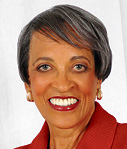The Women of Color Task Force celebrates its 30th annual conference March 2 with an author and activist for social and economic justice as the keynote speaker.
Johnnetta Cole, director of the Smithsonian Institute’s National Museum of African Art, will give the keynote lecture at 8:30 a.m. in Rackham Auditorium. Her topic is “The Business Case for Diversity & Inclusion in American Higher Education.”

Cole
Cole, the immediate past president of Bennett College, Greensboro, N.C., was the first African-American woman to serve as president of Spelman College in Atlanta.
As the largest professional development event at U-M, this year’s conference — “30 Years of Leadership, Legacy, and Change” — is from 8 a.m. to 5 p.m. at the Michigan League, and the Modern Languages Building.
The conference is open to the public, but registration is required at www.cew.umich.edu. There is a cost to attend the event.
About 36 workshop sessions will address topics such as professional and leadership development, work-life balance/personal development, and financial education.
The conference is sponsored by TIAA-CREF, which will offer financial workshops during the event.
The annual, daylong gathering was first offered in 1983 by the Minority Women Task Force, which started its professional development sessions in 1979. The group’s founders, Jennie Partee and Beulah Sanders Stafford, gathered other African-American employees to discuss employment concerns, such as dealing with gender bias in the workplace.
“They were able to know more about the university and what knowledge, skills and abilities were needed to advance despite perceived or real gender biases,” says Laurita Thomas, associate vice president for human resources and one of the group’s original members.
Joyce French, a research assistant in social and behavioral sciences, has networked with many staff members during her 27 years with the task force. She says she looks forward to the conference because new workshop sessions are presented every year.
“I like it because it is invigorating,” French says. “It takes me out of my comfort zone to think of new ways and do new things.”
In the mid-1980s, the Minority Women Task Force became the Women of Color Task Force and its members sought other ethnic groups to join. Cathleen Conway-Perrin, director of LSA Academic Standards and Academic Opportunities, says it was important for the group to be inclusive because sometimes, the staff — compared to faculty — felt unwelcomed and unappreciated, she says.
“We wanted to create a place where people felt valued for who they are, where titles and position didn’t make a difference, and where we were all just sisters working together on common goals,” says Conway-Perrin, who served on the task force for 16 years.
Thirty years after its first conference, there’s still a strong desire by many U-M employees to learn from others about their experiences and to create avenues for career advancement and success, Thomas says.
“The hunger is great because careers plateau due to the economy and not a lot of jobs to move to,” Thomas says, noting this will change within the next decade as Baby Boomers in key U-M positions retire.
For more information about WCTF contact Program Coordinator Janice Reuben at 734-764-6331 or email [email protected].

